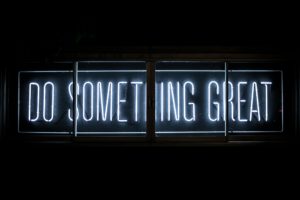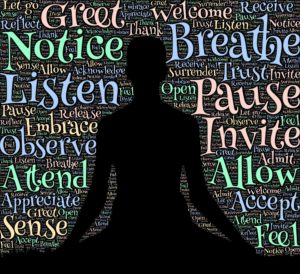 Self-awareness is critical to success. How well do you know yourself?
Self-awareness is critical to success. How well do you know yourself?
Stay with me here.
We are talking about something much greater and of higher consequence. I am asking about who you are at your core, what most matters to you, what makes you come alive, what feeds your soul and what drains your spirit, and how to know the difference so you choose well as you give your best energy, and commitment to something.
If you are lacking a lot of self-awareness, you may still live a life somewhat in alignment with who you are but only by accident or sheer stroke of luck. And you may be living a life that doesn’t fit. What if you could be certain that you live in alignment with who you are not by accident or luck, but rather on purpose, by intention, by design.
How? By getting improving your self-awareness and getting to know yourself really well. One way to do that is to learn your values, passions, and goals. Another is to ask the right questions. (More about that later.)
In my coaching practice, I’ve been working with people how to create better lives for themselves which in turn changes their work, their relationships, and their happiness. They have grown their “self-awareness” quotient and:
- gotten clarity on their life’s purpose

- determined where they want to go in their career or business
- boosted their incomes
- deepened their relationships
- connected with their gifts
Self-awareness and Mindset
I am so passionate about how we can create the right life for ourselves by first knowing who we are, and then creating the right mindset. So, your mind believes anything you tell it. Is it true? Let’s see.
What is it that you tell yourself all day long? You might be exceptional but most of us walk around saying relatively negative criticisms to ourselves or about ourselves.
Let’s say someone asks you whether you can run a marathon or you can give up dessert for a week. Usually, we hedge unless we’ve already done it. Sometimes the response is immediately I can’t. I can’t learn that or do that. Or you hear yourself saying “I can’t take this anymore” but don’t take action. That phrase “I can’t” is part of our everyday dialogue and that is your message to your mind.
So, how well do you know yourself?
Your mind says “ I can’t do that well, so we’re not going to even bother because I know I can’t do that”. You’ve already woven a story that your mind believes. As you repeat this over time it becomes a fact to you. It becomes the truth whereas it’s really just something you’ve been telling yourself.
Some of you know that I used to be an opera singer in my early career life. At that time, I had a personal transformation in my singing journey that I still to this day cannot believe I am able to do because the story I had been telling myself was so powerful.

I remember a voice teacher telling me that I would have to be able to sing notes higher than a high “C” (think Pavarotti’s high notes) if I wanted it to be a good one in performance. Of course, when my voice was younger, that wasn’t too much of a problem. But as my voice and body matured, my voice was no longer light but instead had a richer, darker middle and lower note capacity which added “weight” to the sound. And it’s hard to take that weight up high.
Now, of course, I know that my body can do this but the first time it happened I had to convince my mind that I was capable of doing this. In reality, my body was already there. My teacher said your body has no limitations on doing this at this point in your singing journey but my mind had been keeping me from doing so because I have been telling myself the same story of “I can’t.” I was trying to sing it but my mind didn’t think I could do it. My mind wasn’t ready to change the outcome.
Knowing yourself and what the mind believes
So what is it that you’re telling yourself all day long that you cannot do, that you don’t know how to do, or what to do, or whatever other negative phrases that you’re using? How well do you know yourself?
Remember: your mind listens and believes you and then uses that as a fact to run your life in a misguided effort to protect you.
You can send it a different message.
You can choose to believe in a different story: a story of being a confident person who CAN make changes and choose differently, and seeing that there is a deeper truth than you’re believing about yourself.
Change your mind on how you see yourself and see how that will integrate into so many better results in your life. Start to question those beliefs. Get to really know yourself.
The opportunity has never been greater to…
- Show up as the people we have grown into becoming
- Sustain thriving relationships
- Discover and follow our highest calling
- Create prosperous careers aligned with our values
- Experience radiant health and vitality
- Live in ways that are spiritually connected
- Ignite and empower others to step forward into their greatness
- Be catalysts and change agents shaping the future of our world
Happiness is when we have clarity of purpose, our work and relationships are meaningful, we have health and vitality, we feel connected to the Universe – in other words, we are in alignment.
If you take this journey, you will realize that: you are a unique human of this world. Are you brilliant, wise, and generous? Perhaps you are perceptive and fascinating. Know this: you are gifted and talented beyond your knowing. You are beyond capable to do what you dream. It starts with getting to know yourself and changing your mind.



 Getting to the next level through coaching
Getting to the next level through coaching supportive environment without judgement. Coaching is non-judgmental listening – helping people to think through the decisions they are in. People often have artificial obstacles in their mind. Coaching can help people reframe issues, so they can resolve those problems.
supportive environment without judgement. Coaching is non-judgmental listening – helping people to think through the decisions they are in. People often have artificial obstacles in their mind. Coaching can help people reframe issues, so they can resolve those problems. Are you the next leader?
Are you the next leader?

 Mindfulness is for everyone, especially leaders
Mindfulness is for everyone, especially leaders



